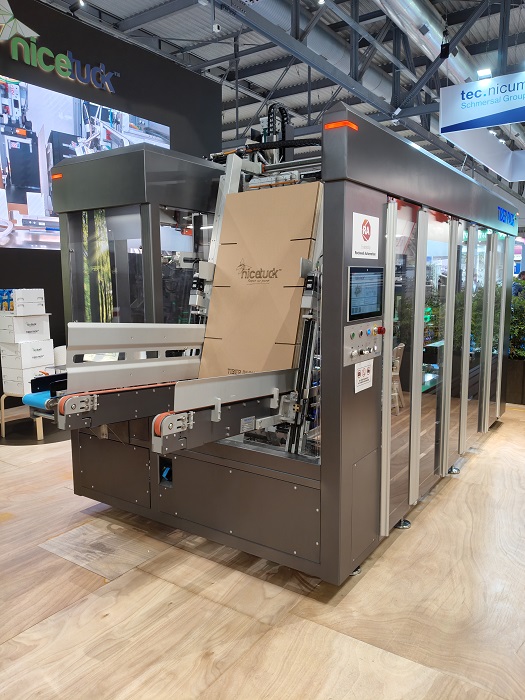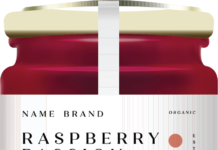Tiber Pack S.p.A., an Italian packaging machinery manufacturer based in Tuscany, has unveiled Nicetuck—an innovative adhesive-free carton closing system—at Ipack-Ima 2025. The new solution eliminates the need for glue, tape, or any adhesive, replacing them with a proprietary mechanical locking mechanism integrated into the paperboard components.
“This is completely adhesive-free—no tape, no glue,” Manolito Ciabatti, chief operating officer and technical director at Tiber Pack, told Packaging South Asia. “It is sealed through a mechanical interaction between specially designed paper components.”
The Nicetuck system is already running with several customers, including Italian snack brand Amica Chips. The company initially installed two traditional glue-based case packers before requesting a full transition to Nicetuck. “A few months after the first installation, the owner told us, ‘We still have the gluer. Please remove it.’ That’s when they fully committed to the Nicetuck system,” Ciabatti explained.
To date, Tiber Pack has supplied five Nicetuck machines to Amica Chips. Beyond eliminating adhesives, the system significantly cuts operating costs and improves sustainability metrics. A life cycle assessment conducted by the company shows a 51% reduction in climate impact compared to conventional hot melt gluing systems.
The innovation has drawn global interest at Ipack-Ima. “Yesterday I spoke with visitors from North and South America, and Sweden,” said Ciabatti. “There’s a lot of excitement around this solution.”
Founded in 1968 and headquartered in Sansepolcro, about an hour south of Florence, Tiber Pack is now seeing its most significant commercial breakthrough. “We currently have around 10 machines in the market,” Ciabatti said. “And we signed an agreement to supply multiple units to a major company. It’s the largest order in our history.”
International demand is also growing, with installations already completed in Europe, the United States, and Southeast Asia, including Bangkok. “The idea behind Nicetuck was mine,” Ciabatti added. “And now it’s taking off around the world.”
Beyond gluing: how Nicetuck redefines sustainable case packing
Nicetuck marks a major departure from glue-dependent packaging by offering a completely mechanical closure system. It replaces traditional hot melt adhesives with a smart paper-based design that enhances recyclability, eliminates glue-related emissions, and reduces overall energy use across the packaging line.
Environmental and economic impact
Developed with sustainability in mind, Nicetuck delivers a measurable reduction in environmental footprint. According to a third-party-verified life cycle assessment conducted with TÜV Italia (TÜV SÜD Group), the system cuts CO₂-equivalent emissions by 50% in the “Climate Change” category compared to hot melt applications. Additional benefits include the elimination of glue manufacturing, storage, and transport emissions.

Operational savings are equally compelling. Without the need for glue tanks, heating elements, or regular maintenance on adhesive equipment, Nicetuck streamlines packaging operations while cutting costs and reducing downtime.
Despite its adhesive-free design, Nicetuck delivers high-performance packaging, according to Ciabatti. The mechanical lock offers excellent resistance to stress and compression during transit. Independent testing by Centro Qualità della Carta, part of the LUCENSE Research Institute, confirms its effectiveness in protecting contents.
Importantly, the system achieves this without compromising efficiency—maintaining the same die-cutting yield as standard cartons. Its “delicate touch” avoids tearing or deformation while ensuring a clean, precise seal.
Flexible, retrofittable, and user-friendly
Nicetuck is designed for seamless integration and adaptability:
- Can be operated manually or fully automated.
- Easily retrofittable into existing packaging lines.
- Compatible with or independent from glue-based systems.
Responsible packaging, stronger brands
By eliminating glue residues and related hazards, Nicetuck enhances workplace safety and supports responsible manufacturing practices. It also reinforces brand reputation, helping manufacturers align with sustainability goals and appeal to environmentally conscious consumers.











